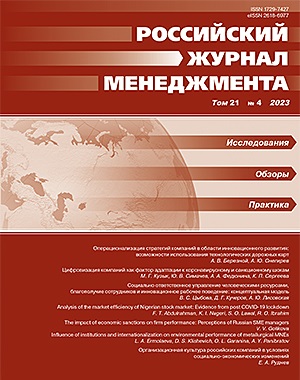Социально ответственное управление человеческими ресурсами, благополучие сотрудников и инновационное рабочее поведение: концептуальная модель
DOI:
https://doi.org/10.21638/spbu18.2023.403Аннотация
Цель исследования: разработка концептуальной модели связи практик социально ответственного управления человеческими ресурсами, поддержания благополучия сотрудников и инновационного рабочего поведения.
Методология исследования: в основе исследования лежит аналитический литературный обзор по вопросам социально ответственного управления человеческими ресурсами, благополучия сотрудников и инновационного рабочего поведения.
Результаты исследования: разработанная модель базируется на идее о том, что практики поддержания благополучия сотрудников зависят от практик социально ответственного управления человеческими ресурсами. Практики поддержания благополучия сотрудников, в свою очередь, выступают источником стимулирования инновационного рабочего поведения.
Оригинальность и вклад авторов: работа представляет первый этап исследования, в рамках которого на концептуальном уровне сформировано представление о потенциале синергии «социально ответственное управление человеческими ресурсами — благополучие сотрудников — инновационное рабочее поведение» и обозначен потенциальный вклад социально ответственного управления человеческими ресурсами в управление благополучием сотрудников и развитие инновационного рабочего поведения.
Ключевые слова:
социально ответственное управление человеческими ресурсами, благополучие сотрудников, инновационное рабочее поведение, концептуальная модель
Скачивания
Библиографические ссылки
References in Latin Alphabet
Translation of references in Russian into English
Загрузки
Опубликован
Как цитировать
Выпуск
Раздел
Лицензия
Статьи журнала «Российский журнал менеджмента» находятся в открытом доступе и распространяются в соответствии с условиями Лицензионного Договора с Санкт-Петербургским государственным университетом, который бесплатно предоставляет авторам неограниченное распространение и самостоятельное архивирование.





